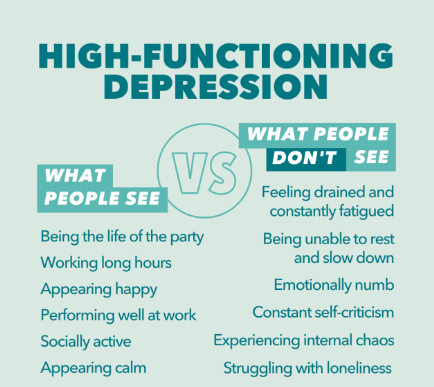High-functioning depression is sometimes called “smiling depression.” Folks hide sadness behind smiles, making it tricky to see. They may have milder symptoms than major depression. They can work and form relationships, but struggle with physical complaints. They might use drugs or alcohol.
With high-functioning depression, people appear to go through the motions. They don’t enjoy stuff like before. Making choices is hard. They feel disconnected from others and persistently down for almost over two years. It’s challenging to identify high-functioning depression.

Externally, individuals seem fine, but internally, they suffer. Seeking therapy, medication, self-help strategies, and lifestyle adjustments are vital. These measures prevent potential mental health crises.
When it comes to mental wellbeing, “high-functioning depression” can be tricky to spot. It silently impacts many lives, flying under the radar. Jeffrey Meltzer, a licensed therapist and mental health advocate known as @therapytothepoint, highlights 7 nuanced signs that may signal high-functioning depression. Recognizing these subtle cues is key to raising awareness and supporting those facing this complex emotional challenge.
The Mask of Normalcy: The Hidden Struggle
High-functioning depression is marked by the talent to put on a normal mask. People dealing with this struggle to cover up their inner pain. They do daily tasks well. The disguise makes it hard for them and others to see their hidden fight.
Endless Exhaustion: The Lingering Weight of Depression
Enduring persistent exhaustion is a prevalent symptom of high-functioning depression. Meltzer emphasizes the relentless struggle with low energy, creating an overwhelming feeling of perpetual fatigue. Despite efforts to recharge, individuals find themselves caught in an exhausting cycle, fostering a sense of helplessness and a longing for renewed vitality.
Numbing Habits: Escaping Emptiness in Unhealthy Retreats
A noteworthy sign of high-functioning depression is the adoption of numbing habits. Engaging in mindless activities such as excessive social media scrolling, consuming unhealthy food, or indulging in prolonged video gaming sessions may serve as a subconscious attempt to numb the profound feelings of emptiness. This behavior often coincides with a diminished pleasure in activities that once brought joy and vibrancy.
Small Irritations, Major Triggers
Meltzer underscores the importance of recognizing when small irritations transform into major triggers for individuals experiencing high-functioning depression. These triggers, seemingly inconsequential to others, can provoke intense emotional responses, unveiling the intricate emotional landscape that lies beneath the surface.
Persistent Self-Criticism
Self-doubt is another difficult aspect of high-functioning depression. While handling duties well outwardly, people suffering this issue often criticize themselves harshly. Their inner voice judges relentlessly. This contributes to feelings of emptiness inside, making true self-worth hard to find.
Read More: The Ultimate Guide to Superior Oral Health with Innovative Purple Toothpaste
Lost Pleasures: Fading Colors of Once-Joyful Activities
High-functioning depression manifests in the subtle fading of joy from once-enjoyable activities. Meltzer poignantly describes it as if the vibrant colors have dulled, leaving a monochromatic experience where even activities that once ignited passion lose their luster. Recognizing this shift is pivotal in understanding the depth of emotional disconnection.
Social Isolation: The Lonely Echo of Concealed Struggles
Social isolation becomes a telling sign of high-functioning depression. Despite outward engagements in work or social events, individuals grappling with this condition may find themselves increasingly withdrawn, keeping their struggles hidden behind a façade of normalcy. Recognizing this withdrawal is crucial for fostering meaningful connections and providing support.
How to Manage High-Functioning Depression?
To handle high-functioning depression, people try diverse ways. It includes therapy, medication, lifestyle shifts, and self-care3. Here are key approaches for managing this kind of depression:
Therapy
Cognitive-Behavioral Therapy helps folks develop coping skills. CBT challenges negative thinking patterns, boosting overall well-being.
Group therapy provides a community feel. Support groups offer understanding and shared experiences to aid managing high-functioning depression.
Medication
Antidepressants like SSRIs may get prescribed. These meds can relieve symptoms, restoring brain chemical balance.
Lifestyle Changes and Self-Care
Regular exercise significantly benefits mental health. Physical activity helps manage high-functioning depression symptoms.
Mindfulness, relaxation methods – powerful tools. These coping techniques aid with high-functioning depression.
Maintaining a balanced diet supports mental wellness.
Adequate, quality sleep is crucial for depression symptom management.
Finding Assistance
Professionals Aid: Consulting mental wellness experts shows fortitude, not feebleness, towards enhancing mental state and satisfaction.
Self-Tending: Adopting self-care habits like mindfulness, exercise, and healthy routines significantly contribute to managing high-functioning depression.
Merging therapy, medication, lifestyle adaptations, and self-care methods allows people to effectively handle high-functioning depression, striving for fulfillment despite its trials.
Conclusion
In conclusion, unmasking high-functioning depression requires a nuanced understanding of these subtle signs. By bringing these indicators to light, we aim to foster awareness, empathy, and support for those navigating the intricate landscape of mental health. Let us dismantle the stigma surrounding silent battles and cultivate an environment where seeking help is met with compassion and understanding.
FAQs
What are the long-term effects of high-functioning depression?
The long-term impact of high-functioning depression on both mental and physical health can be substantial. Long-term effects include physical health problems, social isolation, relational strain, chronic stress, increased risk of major depressive episodes, and decreased quality of life. Chronic stress, social isolation, strained relationships, and a lower quality of life might result from these symptoms. Seeking professional assistance for early detection and therapy is imperative for those with high-functioning depression in order to manage symptoms, avoid long-term consequences, and enhance overall mental health.
What are some coping mechanisms for high-functioning depression?
Treatment options for high-functioning depression include counseling, medication, lifestyle modifications, and self-care routines. Antidepressants reduce symptoms, and cognitive-behavioral therapy (CBT) aids in the development of coping mechanisms. Self-care requires a shift in lifestyle to include things like social support, mindfulness, stress management, sleep, physical activity, and a balanced diet and diet.

